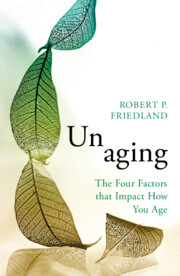Book contents
- Unaging
- Reviews
- Unaging
- Copyright page
- Dedication
- Contents
- List of Figures and Tables
- Preface
- Part I Foundations: What Do We Need to Know about Optimal Aging?
- Part II Applications: What Can We Do about the Opportunity of Aging?
- 12 Overview
- 13 Physical Activity
- 14 Whole Body Health
- 15 Mental Activity
- 16 Psychological Measures
- 17 Social Factors
- 18 Dealing with Stress
- 19 Sleep
- 20 Diet
- 21 Microbial Considerations
- 22 Dental Care
- 23 Dealing with Doctors and Drugs
- 24 Hazardous Behaviors
- 25 Toxic Exposures
- Part III Conclusions
- Acknowledgments
- Glossary
- References
- Index
19 - Sleep
from Part II - Applications: What Can We Do about the Opportunity of Aging?
Published online by Cambridge University Press: 15 September 2022
- Unaging
- Reviews
- Unaging
- Copyright page
- Dedication
- Contents
- List of Figures and Tables
- Preface
- Part I Foundations: What Do We Need to Know about Optimal Aging?
- Part II Applications: What Can We Do about the Opportunity of Aging?
- 12 Overview
- 13 Physical Activity
- 14 Whole Body Health
- 15 Mental Activity
- 16 Psychological Measures
- 17 Social Factors
- 18 Dealing with Stress
- 19 Sleep
- 20 Diet
- 21 Microbial Considerations
- 22 Dental Care
- 23 Dealing with Doctors and Drugs
- 24 Hazardous Behaviors
- 25 Toxic Exposures
- Part III Conclusions
- Acknowledgments
- Glossary
- References
- Index
Summary
Sleep is incredibly important for the creation and maintenance of memories. It is an active process managed by the brain to allow for bodily rest and repair and maintenance of homeostasis. Good sleep is necessary for life and health and is essential for the encoding and storage or memories made during wakefulness. Poor sleep can interfere with all aspects of cognitive function, particularly attention and memory. Reduced sleep amount and quality has been linked to depression and impaired immune function. The length of sleep is not the only important factor; the quality of sleep is also vital. Animal studies have revealed that sleep deprivation damages gut bacteria and produces hazardous free radicals, called oxidative stress. Cognitive reserve is closely related to sleep. Too many people take sleep for granted or think getting a restful sleep is a luxury, not a necessity. But recent research shows the pattern on neuronal firing is replayed during sleep, which enhances the formation of memories. Older people frequently have sleeping problems that may impact the quality of life. This chapter reviews several things that you can do to improve the quality of your sleep.
- Type
- Chapter
- Information
- UnagingThe Four Factors that Impact How You Age, pp. 222 - 224Publisher: Cambridge University PressPrint publication year: 2022

